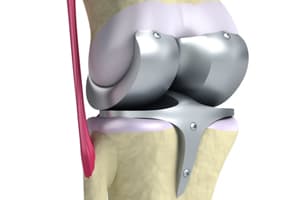
Zimmer Persona Knee Implant Recalled Due to Loosening, Radiolucent Lines Parker Waichman LLP is a national law firm with decades of experience representing clients in medical device injury litigation. The firm is offering free legal consultations to individuals interested in filing a Zimmer knee implant lawsuit. Zimmer recalled the Persona Trabecular Metal Tibial Plate in […]
Zimmer Persona Knee Implant Recalled Due to Loosening, Radiolucent Lines
Parker Waichman LLP is a national law firm with decades of experience representing clients in medical device injury litigation. The firm is offering free legal consultations to individuals interested in filing a Zimmer knee implant lawsuit. Zimmer recalled the Persona Trabecular Metal Tibial Plate in 2015 due to loosening and radiolucent lines.
According to a recall alert posted on the U.S. Food and Drug Administration (FDA) website, the recall was launched after Zimmer received “An increase in complaints of loosening and radiolucent lines,” Roughly 12,000 knee implants are affected by the recall.
Radiolucent lines indicate space between the bone and knee replacement. The presence of these lines means that the knee implant may be moving from its intended fixed location. Zimmer also received reports of loosening, which affects the trabecular metal plate. Patients who experience knee implant loosening may experience complications and adverse events that ultimately prompt an early revision surgery.
Patients with the recalled Zimmer Persona knee implant may experience symptoms and complications including:
• Loosening at the implant site
• Pain
• Instability
• Patella tracking problems
• Tightness in the knee
• Device failure
• Revision surgery
The recall was designated as Class II by the FDA. Class II recalls indicate that exposure to the recalled device can lead to temporary or medically reversible injuries. They can also indicate situations where the risk of serious injury is rare.
The FDA approved the Uncemented Persona Personalized Knee System in 2012. The device was approved via 510(k), a fast-track approval route where device makers do not need to submit clinical data for safety or efficacy prior to obtaining approval. Products cleared through 510(k) only need to be “substantially equivalent” to a previously approved device on the market. This expedited process was not intended for high-risk devices, but some high-risk products were approved through 510(k) due to a regulatory loophole.
Personal injury attorneys note that there has been some criticism surrounding the 510(k) process because it was used to approve certain controversial medical devices, including transvaginal mesh and metal-on-metal hip implants.
Zimmer Recalls Shoulder Implant, Hip Implant
Zimmer, which has acquired Biomet in recent years, has recalled other joint replacement products as well. Recently, Zimmer Biomet recalled the Comprehensive Reverse Shoulder System because the implant was fracturing at higher rates than reported on the device labeling.
The recall was designated as Class I, the FDA’s most serious recall status. Class I recalls indicate that exposure to a recalled device can lead to serious injuries or death.
“Zimmer Biomet is recalling the Comprehensive Reverse Shoulder because these devices are fracturing at a higher rate than is stated in the labeling,” the recall alert states. “Fractures may result in revision surgeries which could cause serious adverse health consequences such as permanent loss of shoulder function, infection, or rarely, death.”
Zimmer also recalled a hip implant product in 2015. The Zimmer M/L Taper Hip Prosthesis with Kinectiv Technology was recalled due to “higher than allowed cytotoxicity levels found with the product. Reasonable probability of adverse biological response and subsequent revision.” The FDA labeled the recall as Class I.
FDA Inspectors Find Quality System Issues at Zimmer Plant
Zimmer received an FDA warning letter in July 2016 citing nine quality system issues at its Montreal facility. FDA inspectors conducted an inspection that January, and found the following products to be adulterated: the iAssist Knee System, Zimmer PSI Shoulder System, Zimmer PSI Knee System, and the Navitrack System.
Regulators said the devices failed to meet good manufacturing practice requirements under the Quality System regulation.

Zimmer Persona Knee Implant Recall, Injury Lawsuits
The FDA warning letter cited issued with Zimmer’s procedures regarding medical device reporting (MDR), correcting and preventative actions, purchasing controls, medical device master records, equipment upkeep (including calibration, inspection, storage and maintenance), quality auditing and record keeping, according to Regulatory Affairs Professionals Society (RAPS).
Additionally, the agency said the iAssist Knee System was misbranded. Regulators ordered Zimmer to “update its procedures … to ensure that all required information is provided or documented refer to CDRH recall classifications to evaluate future corrections and removals.”
Among other things, the FDA identified six instances where Zimmer failed to report product corrections and removals in a timely manner between 2007 and 2011.
Filing a Zimmer Joint Replacement Lawsuit
Parker Waichman has years of experience representing clients in medical device injury lawsuits. If you or someone you know is interested in filing a Zimmer joint replacement lawsuit, contact one of our experienced product liability lawyers today. Our firm offers free, no-obligation case evaluations. For more information, fill out our online form or call 1-800-YOURLAWYER (1-800-968-7529).


